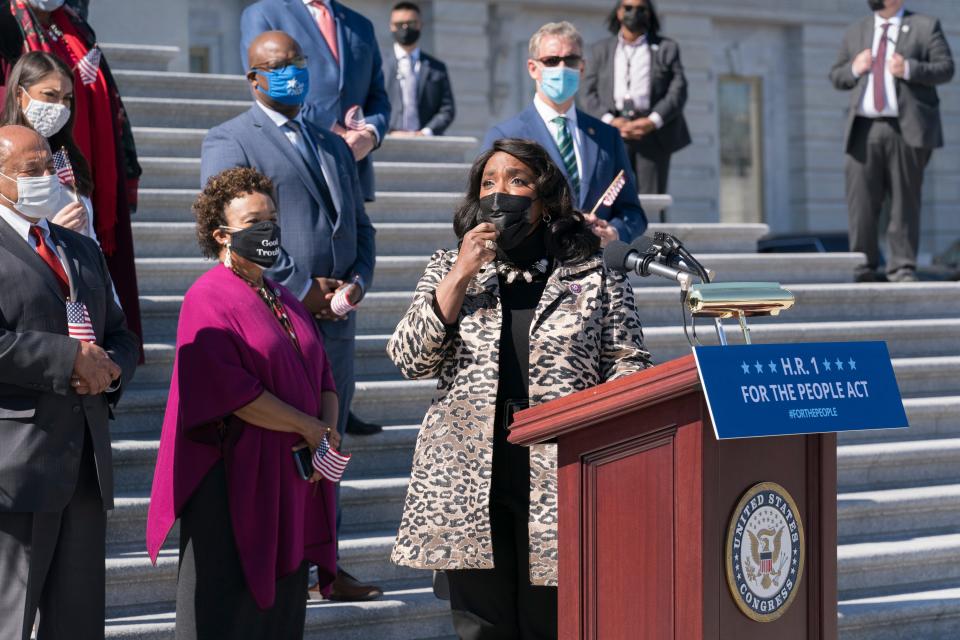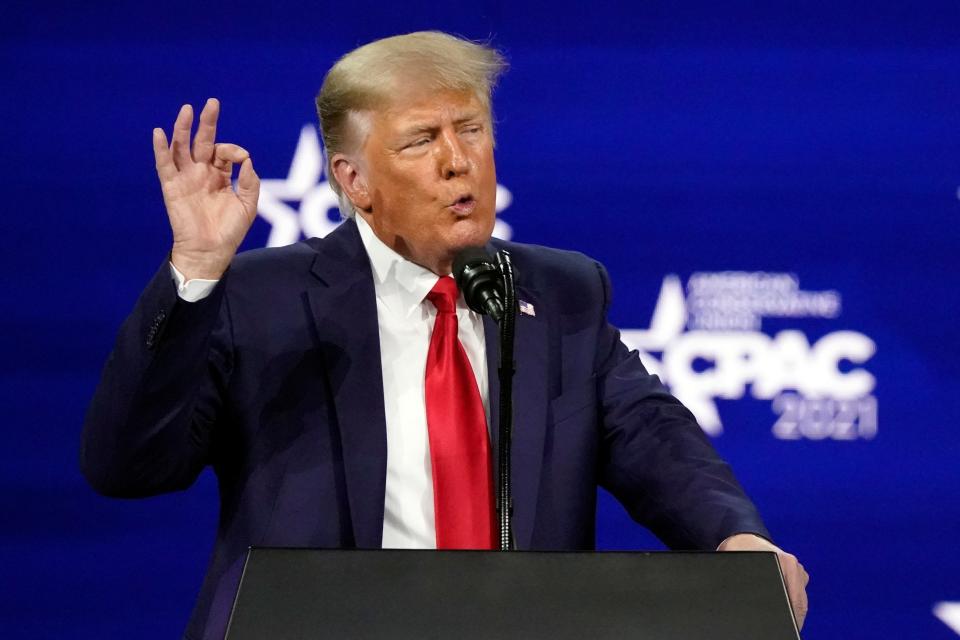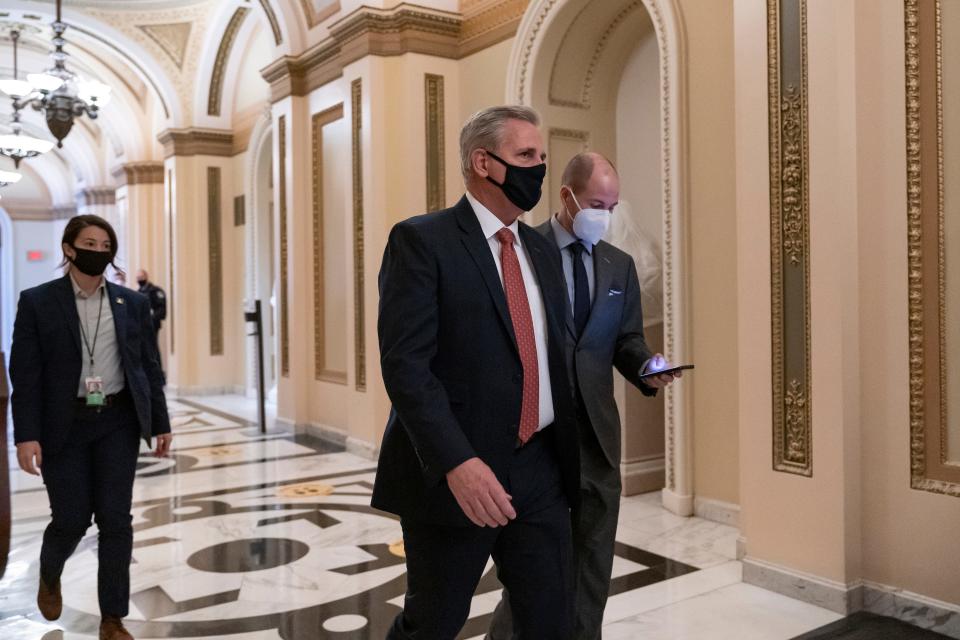Democrats and Republicans are battling over voting rights in Congress and at statehouses. Which side will win?
WASHINGTON – As Republican state lawmakers across the country propose measures that would limit access to voting, Congressional Democrats are pushing sweeping legislation to expand voter access, setting up a national battle over voting rights ahead of the 2022 midterm elections.
The House, led by Democrats, passed Wednesday one of the most sweeping election reform measures introduced in Congress in decades. It includes same-day voter registration and expanding early voting.
“The right to vote is under attack,’’ Alabama U.S. Rep. Terri Sewell, a Democrat, said Wednesday. “Voter suppression is alive and well. Old battles have become new again.”
It's unclear if the Senate will pass the measure. Democrats have an advantage because Vice President Kamala Harris can break a 50-50 tie, but the legislation faces the prospect of a GOP filibuster, a congressional tactic that essentially requires 60 Senate votes.
If Democrats are unable to succeed, how and when votes are cast in 2022 and beyond could be determined by GOP state lawmakers, who have already made moves to limit voter registration, early voting days, mail balloting and other provisions that some say disproportionately affect young voters, low-income voters and voters of color, groups that tend to vote for Democrats.

The election law showdown comes in the wake of allegations by former President Donald Trump and many congressional Republicans that the presidential election, which Trump lost by 7 million votes, was rigged. There is no evidence to back up these claims after months of debate that saw Republican-appointed judges and Trump election officials defend the integrity of the 2020 election, Trump supporters storm the U.S. Capitol on Jan. 6 while threatening to kill lawmakers over the election results, and Trump impeached for a second time over his alleged support for the attack.
Voting rights activists describe Republican efforts to make voting more difficult as an attempt to turn away voters, particularly people of color.
“I certainly think that voter suppression is the single greatest threat to undermining democracy,’’ said LaTosha Brown, co-founder of Black Voters Matter, which led a get-out-the-vote effort across the South and in battleground states last year. “We’re at this intersection of where America has to face her own sins.”
Republicans, however, argue their efforts, particularly at the state level, where elections are run, are to protect against fraud and make sure only eligible voters can cast ballots.
“Democrats did not design #HR1 to protect your vote,’’ House Minority Leader California U.S. Rep. Kevin McCarthy wrote on Twitter Wednesday. “They designed it to put a thumb on the scale of every election in America and keep the Swamp swampy.”
Trump, who has largely remained out of the public spotlight since leaving the White House in January, repeated his unfounded claims of election fraud Sunday at the Conservative Political Action Conference.
“We can never let this or other abuses of the 2020 election be repeated or happen again,” Trump said. “We need election integrity and election reform immediately. Republicans should be the party of honest elections.”
At the center of the election debate are a series of voting measures passed last year that made it easier to vote by mail, register to vote and vote early because of the COVID-19 pandemic. The changes saw a record number of Democrats and Republicans vote in the 2020 elections
GOP-controlled Legislatures are trying to rollback those election changes and impose barriers to make it harder to vote, said California U.S. Rep. Zoe Lofgren, chairwoman of the House Administration Committee.
“H.R.1 would put a stop to that,” she said.
More: Voting rights: Rep. Marcia Fudge is on a mission and coming to a state near you
GOP-led states seek to transform election laws
If enacted, the federal election overhaul would trump many state election laws, some election experts said.
“In general, H.R.1 would create much more uniformity in how elections are administered across the nation and that means states would have much less discretion,’’ said Wendy Underhill, director of elections for the nonpartisan National Conference of State Legislatures. “And that, if enacted, most would have a great deal of work to do to come into alignment.’’
The provisions would apply to federal elections, but most states adopt those measures for all their elections, such as state senate or mayoral races, said Wendy R. Weiser, vice president and director of the Democracy Program at the Brennan Center for Justice at New York University's School of Law in New York City.
“H.R.1 would counter almost all of the vote suppression bills pending in state legislatures and would nullify all the worst restrictions,’’ she said.
House Democrats are also pushing for passage of the John Lewis Voting Rights Advancement Act, which would, among other things, restore a key provision of the 1965 Voting Rights Act that required states with a history of discrimination to get federal clearance before making election changes.

State lawmakers debate hundreds of election laws
While Republican-controlled states have long adopted measures to restrict voting, election experts and voting rights activists said proponents of such provisions have stepped up their efforts in recent years.
“Over the past decade we've seen a growing and increasingly brazen push in states across the country to make it harder for eligible people to vote,’’ said Weiser, adding that the bills often target voters of color. “This year we've seen a dramatic spike.”
The Brennan Center has tracked more than 253 bills in 43 states seeking to restrict access to voting, such as by reducing early voting hours. That number is more than seven times the number introduced at the same time last year, Weiser said.
She said the push by Republican lawmakers is fueled in part by Trump’s attack on the 2020 elections and “the big lie about that election being marred by widespread voter fraud.’’
Former first lady Michelle Obama, co-chair of When We All Vote, a nonprofit civic engagement group, said some leaders are trying to reverse hard-fought voter protections.
"Our democracy remains under attack by the partisan and unpatriotic actions of those at the state level who are doing everything they can to curtail access to the ballot box,'' she said in a statement.
In all, more than 2,000 election-related bills have been introduced in states this session, according to the National Conference of State Legislatures. Of those, about 100 focus on expanding absentee and mail-in ballots.
Underhill said some measures aim to clarify the process, including setting rules for drop boxes, which hadn’t existed in most places before the pandemic.
Roughly 700 bills proposed by state lawmakers aim to improve access to voting, including allowing for automatic voter registration, same-day registration, expanding online registration and restoring voting rights for people with criminal convictions, according to the Brennan Center.
“The news isn't all bad,’’ Weiser said. “But it doesn't have the same threat level and momentum level right now. It doesn't negate the vote suppression.”
GOP lawmakers warn of unsupported claims of fraud
In several states, lawmakers have already passed Republican-backed measures that would reduce voter access to the polls. Proponents argue the measures help provide election law uniformity in those states.
In Iowa, Republicans introduced measures that would reduce the period to request absentee ballots to 70 days from 120 days and shorten early voting from 29 days to 18 days.
"Setting absentee voting at 18 days will limit voter remorse, the length of time campaigning in this state and allow more time for informed voting," said GOP state Sen. Roby Smith, the bill's sponsor, according to the DesMoines Register.
Earlier this week, the Georgia state House approved a bill that would require photo ID to vote absentee, among other changes.

Black activists push for voting access
The flurry of action by states to adopt new election laws or revise them is not new, experts said. After nearly every presidential election, there are proposals to change the electoral college and dates of primaries.
"What works in New Hampshire is not going to work in Washington state,” said Thomas Hicks, vice chair of the U.S. Election Assistance Commission.
Republicans and Democrats are introducing measures they claim will improve the process, said Hicks.
“There needs to be a real healthy debate on that so that whatever we have we make sure that people are able to cast their vote and have their votes counted as they intended,’’ he said.
Brown, of Black Voters Matter, said her group and other voting rights organizations have vowed to put pressure on the Senate, state legislatures and others, including businesses, to support bills expanding voting rights protections.
“This isn’t just a question around a political party. We’re saying this is a question around democracy … This is a question around what side are you on?’’ she said. “This should not be a battle just for Black people to fight.”
Contributing: Savannah Behrmann of USA TODAY and Stephen Gruber-Miller of the Des Moines Register
Follow Deborah Berry on Twitter: @dbgannett
This article originally appeared on USA TODAY: 'For the People' voting rights bill could stop GOP election laws